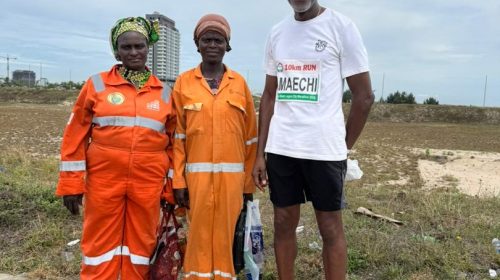Staying ahead of risks – the rise of the accountant as the ‘guardian of information’

More collaboration, more collective action needed to tackle the risks ahead
An unmissable era is dawning for the accountancy profession and its role in effective risk management as a result of the global pandemic, environmental sustainability and economic turbulence, says ACCA (the Association of Chartered Certified Accountants).
In its new report Rethinking risk for the future, ACCA asserts that as guardians of information, accountants can help organisations not only detect and better understand the emerging risks and opportunities facing them, but also cultivate the mindsets needed to think more long-term.
Capturing the views of its global members, including members in Nigeria, the report also showcases their vital roles in building operational resilience through Enterprise Risk Management (ERM), financial reporting, and predictive data analysis.
The report explains that while COVID-19 is the biggest crisis in a generation, business and society also face huge risks from rapid climate change – perhaps the biggest risk of all. Risk management has therefore been forced to centre stage like never before. Accountants now have an unmissable opportunity to reassess how they can add more value in a post-Covid world where a myriad of pressing environmental, social and economic risks are prevalent.
For the report, Nigerian respondents were asked about what they believed to be the biggest risks to their organisations over the next two years, with 29% saying industry disruption and 28% extreme weather. They were also asked what risk activity their organisation would most likely upgrade in 2021, with 37% saying operational resilience followed by 30% saying risk culture for new working conditions.
Rachael Johnson, report author and ACCA’s head of risk management and corporate governance says: ‘What’s clear from our engagement with ACCA members is the need for accountants to truly understand the strategic and business risks that their organisations face in the short, medium and long-term. In this way, through providing better informed decision making, they can help organisations maintain operational resilience and become more sustainable in today’s fast-changing, interconnected environment.’
Helen Brand, ACCA’s chief executive adds: ‘Because of COVID-19, we have all learned new and vital lessons about effective risk management over the last year, so that disruption preparedness is now top of organisations’ priorities. The challenge is about how this readiness is sustained. Professional accountants are central to all this – that’s why now’s the time for the profession to show in real ways how it helps organisations change behaviour, rethink risk, and how accountants can help set the tone from the very top.’
Rethinking risk for the future concludes that risk can no longer be managed in isolation, with Thomas Isibor, head of ACCA Nigeria ending: ‘Accountants, given their skills and professional duties, are in a privileged position to optimise their storytelling skills in new ways by creating more dynamic metrics and reporting methodologies. Accountants should be taking on a more advisory role in explaining the facts and possibilities behind the numbers, breaking them down and putting them into context for their organisations.
‘This is an unmissable opportunity for accountancy to encourage more collaboration and collective action on environmental, social and governance matters by working with public policymakers and partnering with leaders to help grasp how digitalisation and new technologies can help avoid harm to people and the planet.’
The report includes expert insights from ACCA members and others based in Nigeria and across Africa including:
• Akindele Phillips, co-founder and chief risk officer, at Farmcrowdy, Nigeria
• Akofa Dakwa, chief risk officer at Bank of Africa, Ghana
• Wasiu Yusuf, audit and risk professional in the teclo sector in Ghana, and former head of Ethics and Compliance in AirtelTigo, Ghana
• Nii Ardey Tagoe, senior credit risk officer at Ghana Export-Import Bank
• Alfred Brian Agaba, managing director and founder of ACLAIM Africa, Uganda
• Apollo Ekelot, FCCA, Senior Project Control Officer, UNHCR, the United Nations Refugee Agency, Nairobi, Kenya
• Johan Opperman, chief risk officer at Ristco, South Africa, ACCA’s Global Forum for Governance, Risk and Performance
• Francis Kamulegeya, senior partner at PwC in Kampala, Uganda
• Israel Opio, chief risk officer at Ecobank, Chairman Uganda Bankers Association’s Risk Committee, ACCA’s Global Forum for Governance, Risk and Performance, Uganda
• Gerald Paul, chief investment officer at National Social Security Fund, Uganda
• Professor Mervyn King, senior counsel and former Judge of the Supreme Court of South Africa, creator of South Africa’s King IV Code of Corporate Governance and co-chairman, of the Value Reporting Foundation
– ends –
For media enquiries, contact:
Osaretin Odia
E: Osaretin.odia@accaglobal.com
T: +234 (0)90 986 39495
www.accaglobal.com
About ACCA
ACCA (the Association of Chartered Certified Accountants) is the global professional body for professional accountants.
We’re a thriving global community of 233,000 members and 536,000 future members based in 178 countries and regions, who work across a wide range of sectors and industries. We uphold he highest professional and ethical values.
We offer everyone everywhere the opportunity to experience a rewarding career in accountancy, finance and management. Our qualifications and learning opportunities develop strategic business leaders, forward-thinking professionals with the financial, business and digital expertise essential for the creation of sustainable organisations and flourishing societies.
Since 1904, being a force for public good has been embedded in our purpose. We believe that accountancy is a cornerstone profession of society and is vital helping economies, organisations and individuals to grow and prosper. It does this by creating robust trusted financial and business management, combating corruption, ensuring organisations are managed ethically, driving sustainability, and providing rewarding career opportunities.
And through our cutting-edge research, we lead the profession by answering today’s questions and preparing for the future. We’re a not-for-profit organisation. Find out more at accaglobal.com







Leave a Reply